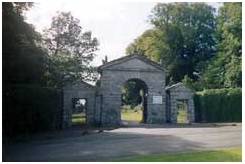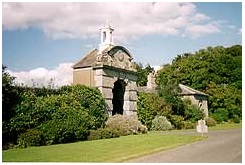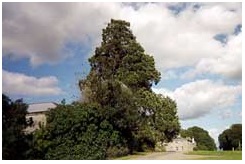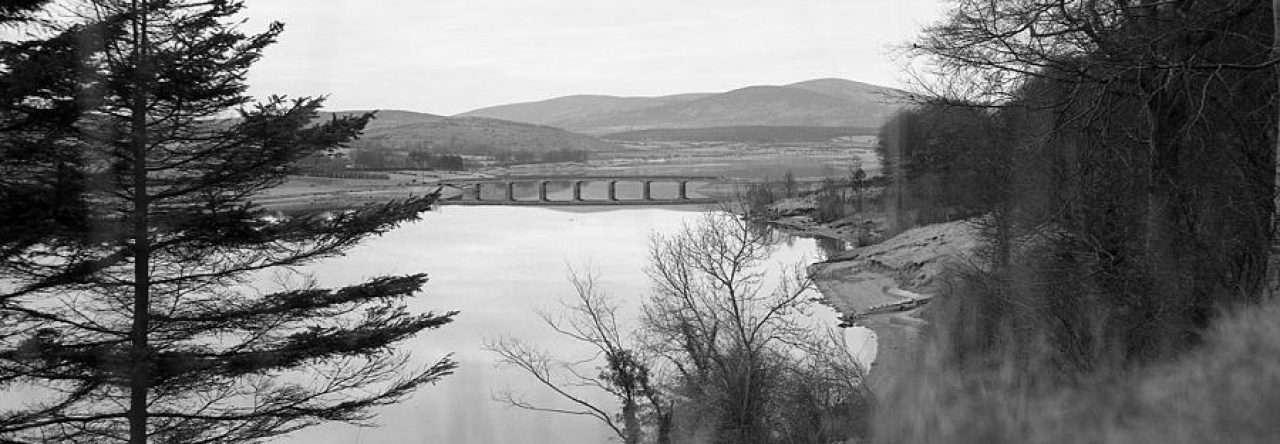
Joseph Leeson of Dublin amassed a large fortune from his brewing business and was able to raise his social standing by building a house in the country. The site at Russborough was admirably suited, being convenient to the city, having picturesque views, with good sporting possibilities and having other houses of note in the locality. The seat of a Marquis ( Downshire ) was just up the road. Nearby were the renowned waterfalls of Poulaphouca. Building began in 1741 and took about 10 years to complete. The architect was Richard Cassels, a German. The granite is said to have come from Golden Hill. In order to raise the site for a better view and aspect thousands of tons of earth were drawn there by horse and cart, having been loaded by spade and shovel. The work thus provided was of factory proportions, and even when the building ended activity continued in maintaining the house, lawns, stables, gardens, farm and so forth. (One reason why Blessington itself stagnated in the 19th Century was that it had not a ” great house ” which might have generated activity.)
One would love to know something of the daily lives of the ordinary coachman, butler, groom, blacksmith, farm worker etc. who spent their lives at Russborough. Unfortunately no records of such exist. In fact Deirdre Rowsome, Curator, informs me that there are very few records of any kind about the place. The nearest we can get are the diaries of Elizabeth Smith of Baltyboys, who refers quite a bit to her contacts with the Earl of Milltown and Lady Milltown, from the year 1840 onwards. The relationship between the two women was a strange one, Mrs Smith the canny Scot, Lady Milltown the frivolous, weak and spendthrift object of scorn, sometimes pity, and even affection. The following are some quotations from the diaries, for the use of which I thank the National Library.

Jan. 1840 : The Doctor told us Lady Milltown was not well, complaining of no one ever calling on her, out of spirits. Her Lord complaining that she never dresses till near dinner time. With that beautiful house, full of the choicest works of art she has no pleasure in it but to see it now and then dusted.
Hal and I walked to Russboro’, found Lady M. in and so agreeable we staid an hour hearing her talk. In praise of John Robinson as a man of business and talent and as a gentleman. Against the priests and Irish generally. About the queen and her temper.
John says that in the Queen’s Co. when he is receiving Lady M’s rents the tenants will pay a small proportion, fall on their knees, declare they cannot pay another penny. He calls in the Driver, orders him to proceed immediately to distrain their goods, and then from out of some secret pocket comes the whole rent to a fraction———-but here they are neither honest nor truthful nor industrious and full of wild fearful passions that won’t be rooted out for many generations.
July 1843 : Lady M. drove up to ask us all to spend 2 or 3 days at Russborough, and she would hardly take any denial.
Aug. 1845 ; Hal and the girls went to Russ. Yesterday evening. The Duke of Leinster good natured, his Duchess noisy.
May 1846 : My Lady, her 2 daughters, and her 2 younger sons came to tea. The children happy and agreeable, their mother such a mass of affection as to be almost intolerable, beyond merely ridiculous. Half her words in French—lolling on the sofa—dressed for a ball—grand to the sublime, and to crown it all quite youthful—somewhere about 35, and this to me who have often compared ages with her in our early days—-
July 1846 : After dinner Annie and I drove to Russ. Where I had long owed a visit. I set out at 4 o’clock and did not get back till 8, so glad was Miladi to have a visitor. Annie was sent off with the girls to gather mushrooms. I had to listen to many complaints, a good deal of scandal, some fun— Then we walked out to see many real improvements in the grounds—a new flower garden, a hot house building, greenhouse preparing, iron gates projected. Brought to the Dressing-room for a cup of tea to review the whole of the Paris wardrobe. It was quite a bridal array, and for what purpose, for the poor woman goes nowhere—-She showed me some trinkets too, presents from him—-60, 70, 80 guineas. And in the last paper was his ad to raise £10,000 upon her life annuity—the 3rd insurance of the same kind, which with the interest paid to the Coates after the lawsuit went against him, reduces her once handsome income by one half.

Nov. 1846 : Lady Blakenay was giving me some Irish gossip. She assures me our neighbours are quite shunned, he is considered a blackleg, a regular cheat, often by signals from her, and her impertinence is no longer tolerated.
May 1847 : She (Lady M.) is to be pitied. He is at Chester races, and she has not a farthing or the hope of one. A visit from Lady M. He has gone to join the Repeal Association and made a speech. Lord M. delighted with his speech and the puff in the repeal papers—-and so, says Mr. Foster, the poor gentleman will amuse himself, now that he has no money for Newmarket.
Aug. 1849: Queen Victoria in Dublin —Leesons were at the Ball. We drove yesterday to Russ. and saw all in high good humour. Lord M. had been given the entrée at the levee privately, on account of his infirmity. They were all asked to the private ball, and Lady M. was one of the two Countesses among the 20 selected guests who dined at the Queen’s table.
—————-like Lady M. and her peerage, bought in Mr. Pitt’s time, by a brewer.
Aug. 1850 : We were at Russ. yesterday—in deep mourning for Sir Joshua Meredyth. Poor Lady M., what a weak woman she is in some points. She is so anxious to make herself out years too young, therefore very angry with the newspapers for mentioning her father’s real age; he was indeed very old, and she is old enough as all the world knows. And so to bed Mrs Gossip.”
One document I myself have is a marriage settlement drawn up in 1830 between Cecilia Leeson, spinster, daughter of the Honourable John Leeson and George Hornidge of Burgage Moyle. Trustees of the said settlement were the following : John Aylmer of Courtown, Co. Kildare, Henry Smith of Baltyboys and Richard Hornidge of the City of Dublin. In those days trustees were given charge of the assets of the newly weds and the arrangements made then were legally binding for a few generations. Any children of the union were provided for. In the event of the death of one spouse the other didn’t inherit the estate, but only in so far as had been provided for by annuity. An estate remained with the original family.

The 1840’s brought great hardship and suffering to the labourers and tenants of Ireland. Two million of them died of starvation and disease. A like number emigrated to the British mainland or her colonies, or former colonies. The landlords suffered financially. Their main incomes had come from rents. If the tenants couldn’t pay, but with great difficulty, then the landlords could not meet their commitments. People like the Leesons were already spending beyond their means , and a day of reckoning would have had to come anyway. The Great Famine merely hastened the day. The Government set up The Encumbered Estates Commision to make it easier for landlords , and there were many of them, to shed some of their lands and pay some of their debts. Investors came over from the Mainland of Britain in search of cheap land. I have some copies of such transactions, one of a conveyance from the Earl of Milltown to Lord John Beresford in 1856. The lands sold were:
Kilmalum – 44 acres
Loughnagroe- 230 acres
Humphreystown- 349 acres
Price- £1,910

Any comments or questions would be welcome: To contact Jim Corley please click here


Leave a Reply